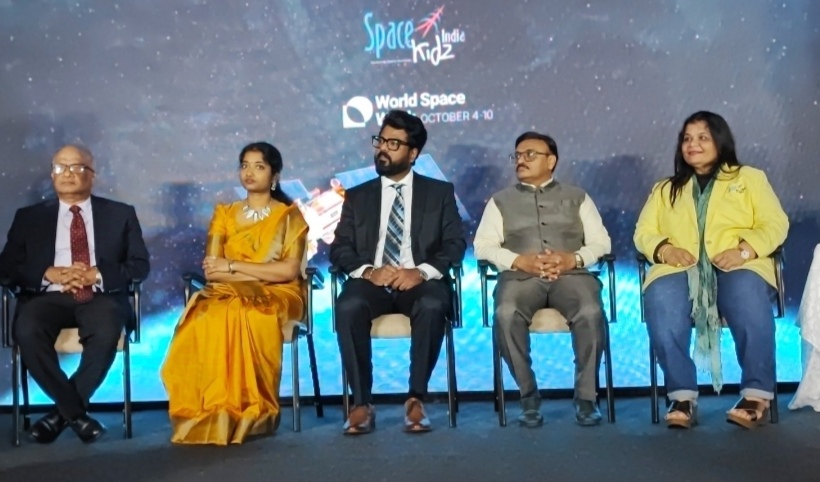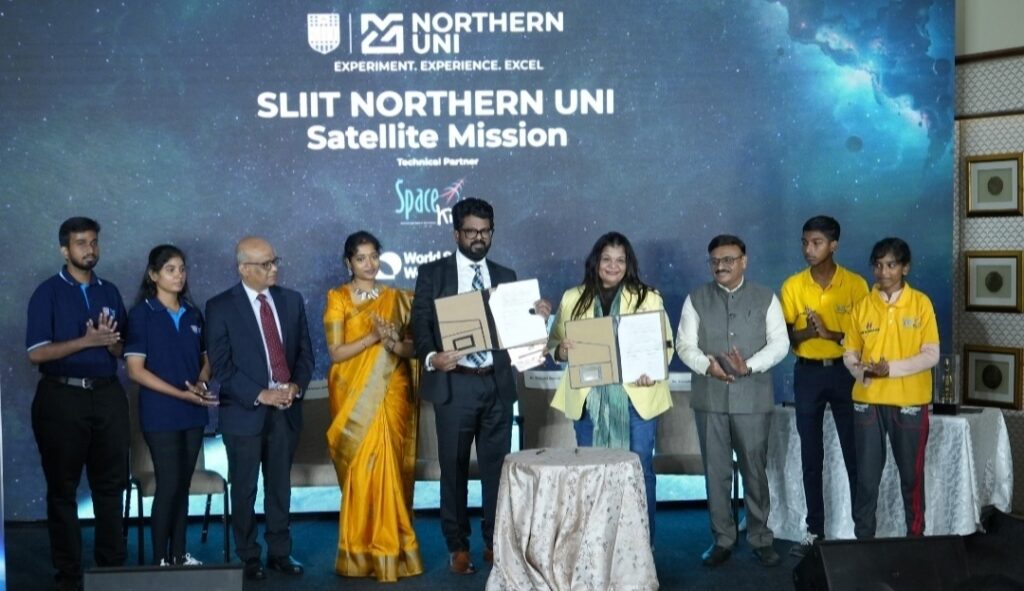
The soon to be launched Satellite will carry an array of sophisticated instruments designed to study the Space atmosphere and demonstrate communication technologies.
This also marks the first student-led Satellite Technology project for the Government School students of Jaffna region in Sri Lanka.
Chennai, 3rd October 2024: In commemoration of World Space Week, Northern Uni today signed a strategic MoU with Space Kidz India to launch a collaborative student-led satellite project, marking a monumental step in space education for the northern region of Sri Lanka. The MoU was signed in the city in the presence of Dr. Prafulla Kumar Jain, Director – InSpace Ahmedabad, Mr. Indy Pathmanathan, Chairman – SLIIT Northern Uni, Dr. Srimathy Kesan, Founder & CEO – SpaceKidz India, Ms. Alma Okpalefe, Executive Director – World Space Week Association and Dr. Saranya Jaikumar, Educational Psychologist, symbolizing the region’s first foray into space technology. This ambitious project will bring together students from both Northern Uni and Government schools in Jaffna, along with students from India, to jointly design, develop, and launch a satellite. The satellite will carry sophisticated instruments aimed at studying the space atmosphere and demonstrating cutting-edge communication technologies.
This collaborative effort helmed by Northern Uni is expected to yield invaluable data for scientific research while showcasing the technological prowess of student innovators from both nations. This project also offers students a firsthand exposure to satellite technology and also the chance to participate in groundbreaking research that has the potential to contribute innovative solutions to global challenges. The initiative will equip students with essential skills in satellite development, data analysis, and communication technologies, preparing them for future careers in the STEM (Science, Technology, Engineering, and Mathematics) fields. By engaging in this landmark project, students from both countries will play a role in advancing space research and promoting technological innovation that benefits society.
Commenting on the occasion, Mr. Indy Pathmanathan, Chairman SLIIT Northern Uni, said, “This initiative is a giant leap for both Sri Lanka and India in cultivating a culture of scientific collaboration and mutual innovation. Our students, the future citizens of both nations, will gain unparalleled exposure to the intricacies of satellite technology. What excites me most is the way this project fosters cross-border collaboration among students from different backgrounds, cultures, and educational systems. They will not only develop advanced skills in science and engineering but also learn the value of teamwork and shared goals. Through this project, we are building not just a satellite, but a future where innovation knows no borders.”
Adding to this Dr. Srimathy Kesan, Founder and CEO of Space Kidz India, said, “This project represents a shared vision for both India and Sri Lanka—one that sees education, technology, and space exploration as tools for uniting people and pushing the boundaries of what’s possible. By engaging students from both countries, we are planting the seeds of a future generation that will work collaboratively on global challenges. These young minds will become the torchbearers of scientific progress, and their participation in building and launching this satellite is just the beginning. Space technology is an incredibly powerful platform, and through this project, we aim to inspire students to look beyond geographical boundaries and become true innovators and leaders in space science.”
The project is structured into two key phases. Phase 1 will focus on training students in space science and technology, with 50 school students from Sri Lanka, 10 school students from India, and 50 college students undergoing comprehensive training. This phase is designed to give participants a foundational understanding of satellite development and space missions, offering a rich educational experience that combines theoretical knowledge with practical insights.
Phase 2 will involve 30 college students from Sri Lanka who will be directly engaged in building, integrating, and preparing the satellite for its eventual launch. The collaborative process will allow them to work alongside Indian experts and their peers, gaining hands-on experience in satellite construction. Furthermore, 15 college students and 50 school students from Sri Lanka will travel to India to witness the satellite launch, creating a powerful learning opportunity that will inspire future generations to pursue careers in space science and technology.


